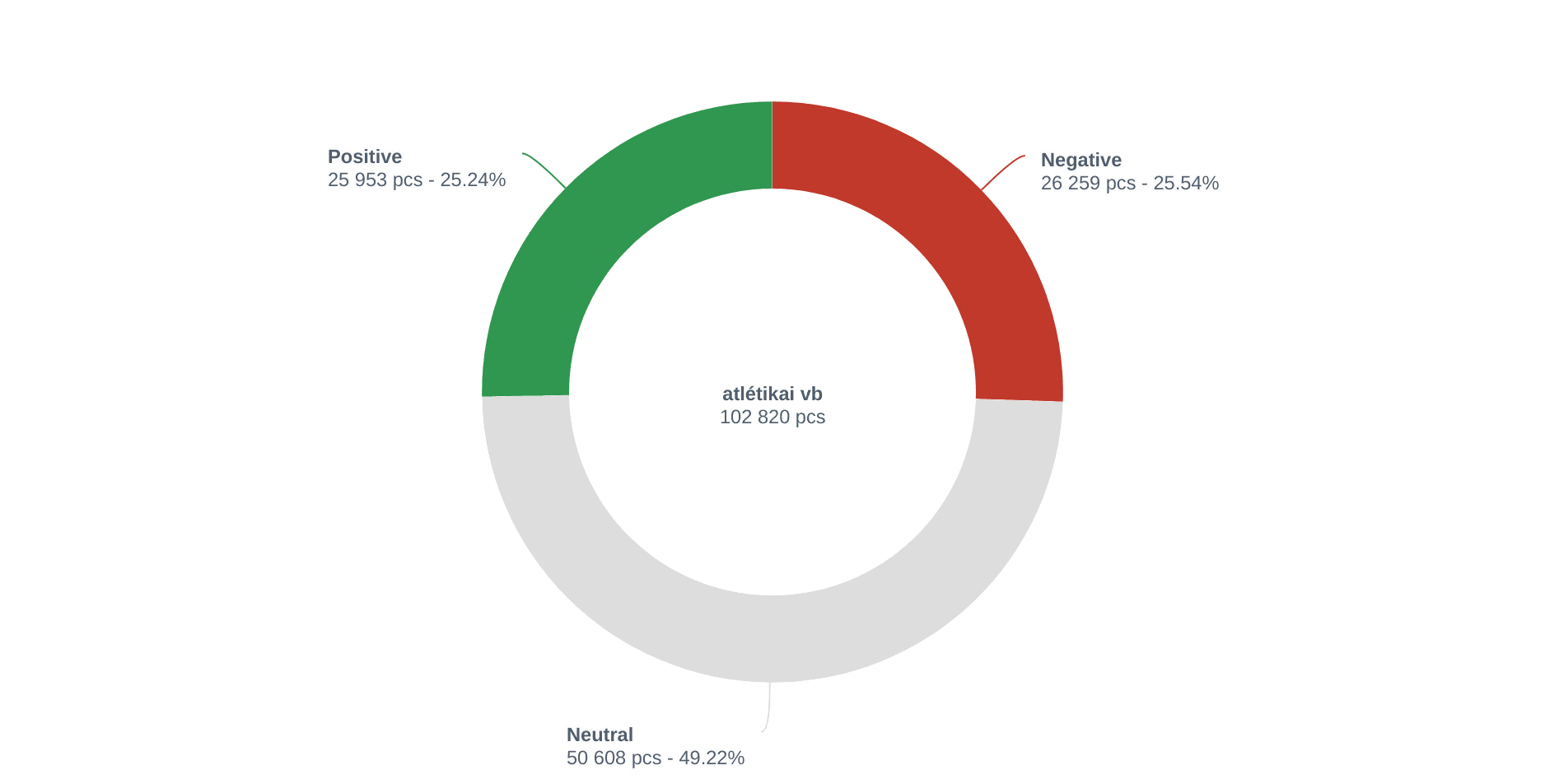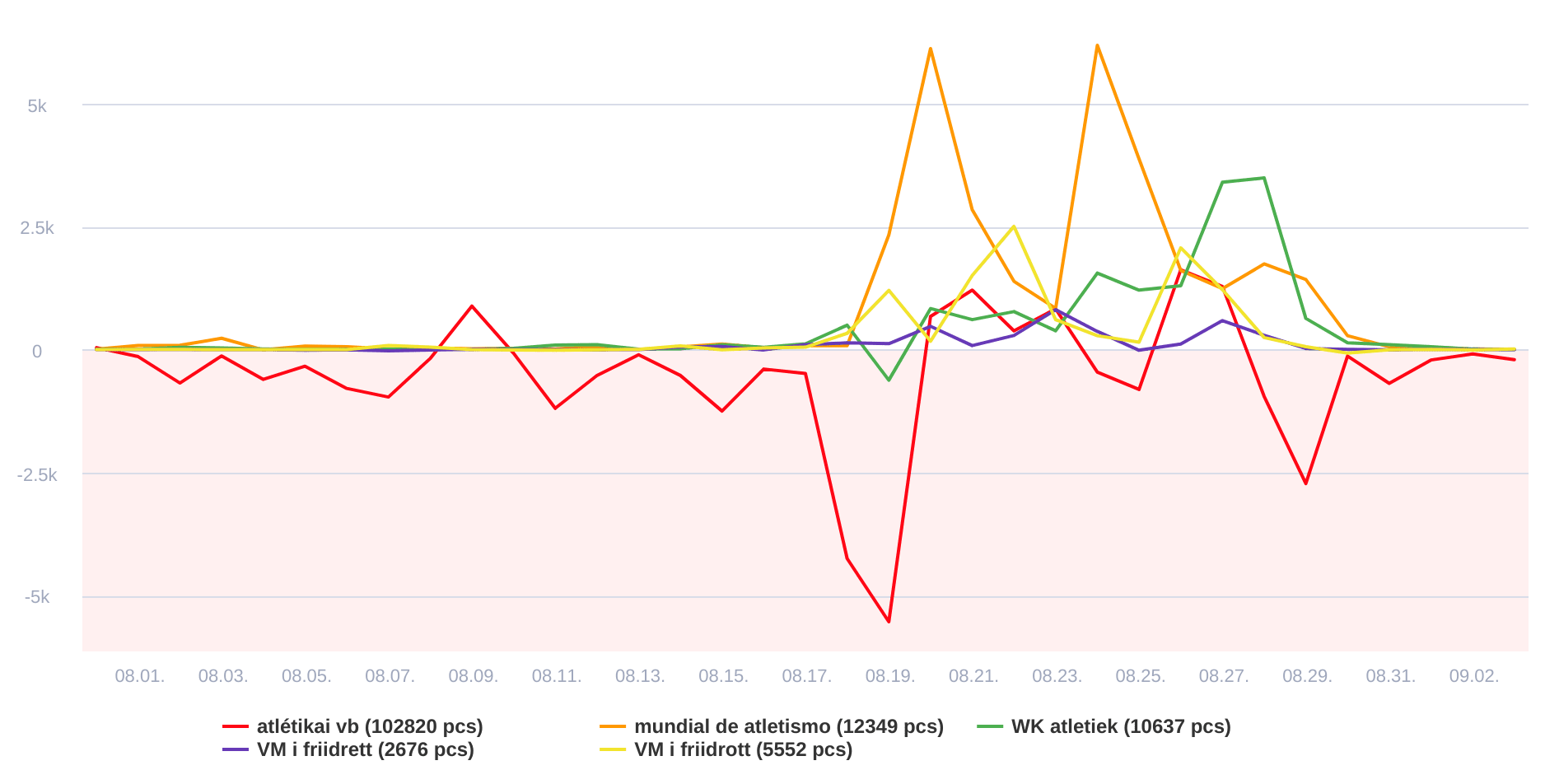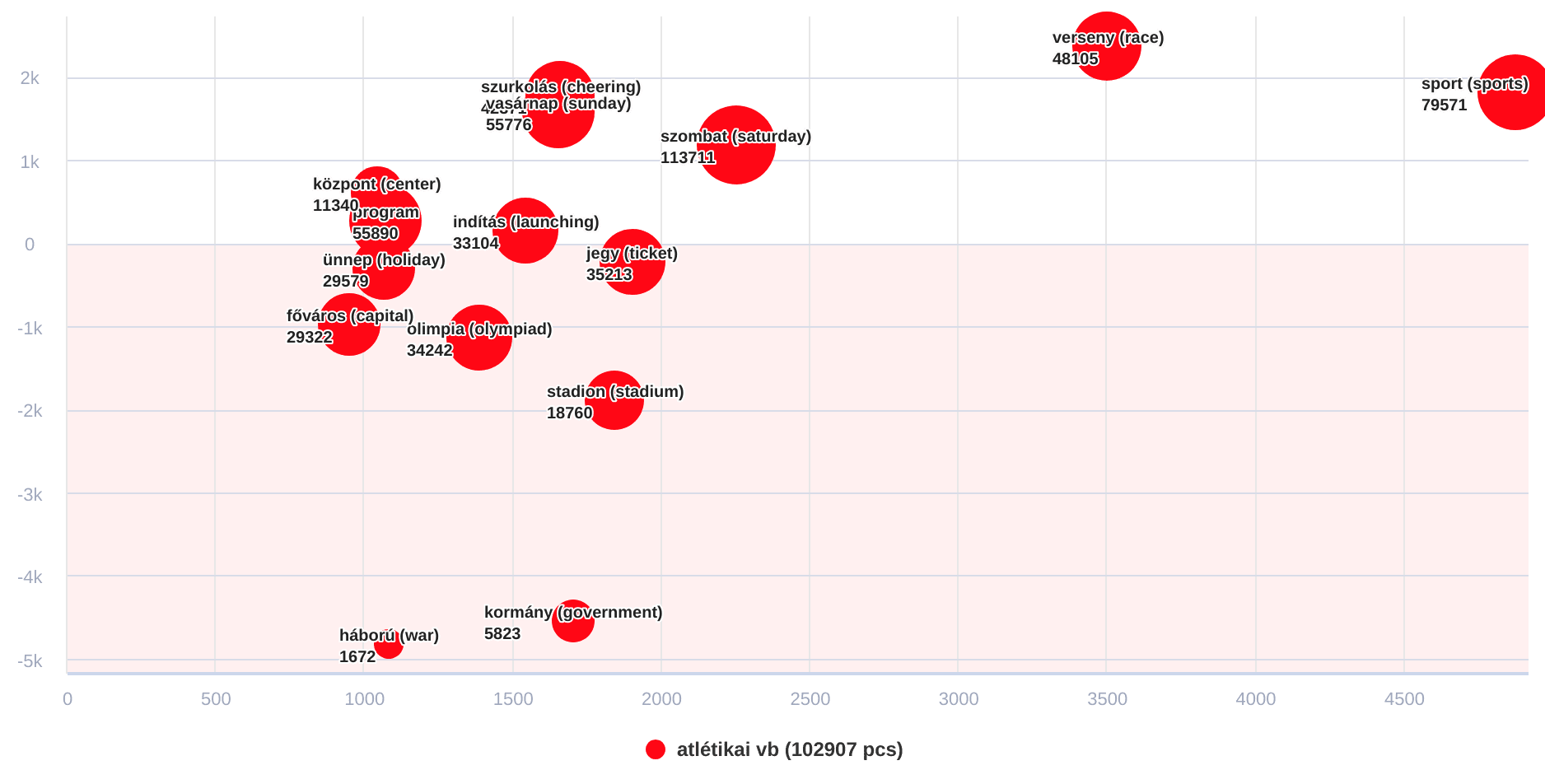One Athletic World Championship, two different lenses
Up to a billion spectators were glued to their tv screens all over the world during the Athletic World Championship in Budapest, but they certainly did not all feel the same way about the event. However, one perspective we’ve found to be strikingly different from the rest is that of the organizers.
The Athletic World Championship was organized for the first time in Budapest, Hungary this year, from 19 to 27 August. 2089 athletes from 195 countries participated, and it is estimated that around a billion people across the globe followed the event’s broadcasts at home. At first glance, the championship seemed a success, but what do online opinions show about it?
With Neticle Media Intelligence, we collected mentions of the championship from the top European nations on the medal board: Spain, Norway, Sweden and the Netherlands, plus from Hungary, the organizer. Mentions were collected in the 5 weeks between the 31st of July and the 3rd of September.
Hungary had by far the highest number of mentions (over a 100 thousand in the examined period), and more than half of these mentions were polarized, too, so the organizing nation had strong opinions. However, the number of negative mentions was slightly higher than positive ones.

In each of the other four countries, positive mentions outweighed negative ones by a significant amount, while even less mentions were neutral than in Hungary! It looks like successful participants had a very different view of the championship than the organizers. Why was that?
.png?width=1876&height=952&name=Atl%C3%A9tikai%20vb-share_of_sentiment-2023-09-11%20(1).png)
Drilling down in the Daily Opinion Index chart – which shows you which days the online crowd expressed many happy or angry opinions – told us the details. Let’s examine the peaks and discover what went down in each country:

In Hungary, you can see a relatively small positive peak on the 9th of August, the reason for that was the news that the number of tickets sold for the championship had passed 300 thousand. However, the next event that generated half of that gigantic negative peak right before the start of the championship was a media campaign in tabloids owned by the governing party, complaining that the capital city is unkempt and full of weeds just when the highest number of foreign guests are arriving. The aim was to pin it on the mayor, who is of the opposition party (even though many of the areas shown in the tabloids are not maintained by the city government). The campaign worked and war broke out in the comments.
The 19th of August was the day of the Opening Ceremony, which was actually the most negative day in the Hungarian Opinion Index. Apart from the weed debate still going on, there were several more negative topics added to the mix. The worst of these was the fact that one of the security personnel at the championship was spotted with a Nazi tattoo on the back of his neck – he was quickly fired.
The championship start was also delayed by two hours due to a huge storm, and then Hungarian discus thrower Róbert Szikszai, triple jumper Dániel Szenderffy and shot putters Dániel Rába and Donát Varga dropped out already on the first day.
The list wouldn’t be complete without mentioning one of the main negative themes of the whole championship in Hungary besides the weeds and the Nazi tattoo: it’s people complaining that organizing the event was too expensive and financially not worth it at all, and blaming the governing Fidesz party.
Even good results couldn’t get Hungarians out of a bad mood for very long
The mood got somewhat lighter on the 21st of August, when pole jumper Hanga Klekner had a PR, and shot putter Bence Halász won bronze (Hungary’s only medal at the championship). The program continued undisturbed despite the heat wave, and on the 26th, spirits were lifted high as both the men’s and the women’s relay team set a new country record time – the women did so after 43 years!
Unfortunately, the World Athletics Championship ended on a negative note again in Hungary, as the war in Facebook comments raged on about the event being too expensive, whether or not the newly built stadium should be dismantled afterwards, and Youhuu the racka sheep, the event’s mascot, behaving inappropriately on various occasions.
 The topic map clearly shows what and how much was discussed in the online space, as well as the topics’ polarity. (The numbers inside the circles demonstrate interaction numbers.)
The topic map clearly shows what and how much was discussed in the online space, as well as the topics’ polarity. (The numbers inside the circles demonstrate interaction numbers.)
Other nations were just out there celebrating their wins
In Spain, the story is much simpler: on the 20th of August, Álvaro Martín and María Pérez both became world champions in the 20-kilometer walk, winning two golds for the country right after the championship began. Four days later, they both won the 35km walk as well, and Mohamed Katir gained a silver in the 5000m run. These three athletes shot Spain to third place on the medal table, and gave reason for nothing but celebration.
For the Dutch, the championship began with quite the drama: the mixed relay team missed out on a first place finish because Femke Bol fell during the 4x400m relay, and another Dutch runner, Sifan Hassan, fell just twenty meters before the finish line during the 10km race on the same day. The media began calling this the “curse of Budapest”. However, Femke Bol made up doubly for the fall later: she won gold in the 400m hurdles, and at the end, the women’s relay team got first place in the 4x400m relay as well. This resulted in the most medals ever for the Dutch team at the Athletics World Championships – and a large positive peak in the online opinion.
The Swedish and the Norwegians didn’t celebrate as loudly as the other two nations we’ve seen, but their WOI remained positive throughout the championship, held up by several medals. First, Perseus Karlström took home a silver medal in the 20-kilometer walk, with a new Swedish record, then discus thrower Daniel Ståhl got the second WC gold of his career with a new championship record as well. Finally, with a staggering 6.1m jump, Armand Duplantis won gold in pole vault and defended his title.
Bentdal Ingvaldsen set a new Norwegian record in the 400m run, and the 1500m run was great for the Norwegians as well, because Narve Gilje Nordås won bronze and Jakob Ingebrigsten won silver – but a gold was expected from him, so the online opinion wasn’t as great as it could have been. On the 27th, he did get a gold in the 5000m run and defended his title, still, an interview with his fiancé was even more popular than news of the medal.
Medals weren’t the only thing generating engagement
There are three instances of engaging content worth mentioning besides the ones we’ve seen so far. First, a video tour of the whole venue on Instagram was loved by fans across the world. Then, Hungarians adored the story of Slovak athletes getting engaged at the finish line of the 35km walk. Finally, looks won over the hearts of the Dutch more than medals: photos of Lieke Klaver got the highest number of likes by far, both when she won the 400m semifinal and when she ended up in sixth place overall.
Listen more to the Voice of the Citizen
The bottom line? An enormous event like this isn’t only going to draw attention from sports fans, but from local citizens and taxpayers, too. Hungary made a very large financial investment in organizing this world championship, and building the venues leaves a mark on the capital city as well. The locals form an opinion no matter how many medals or international attention the championship results in, so it is advisable to pay attention to their voice and needs as well. Otherwise, the event’s reputation might get out of hand, as we’ve seen this time. In this regard, it’s hard to call the event a success for the organizing nation.
Get your sports event's reputation checked now!
Share:




